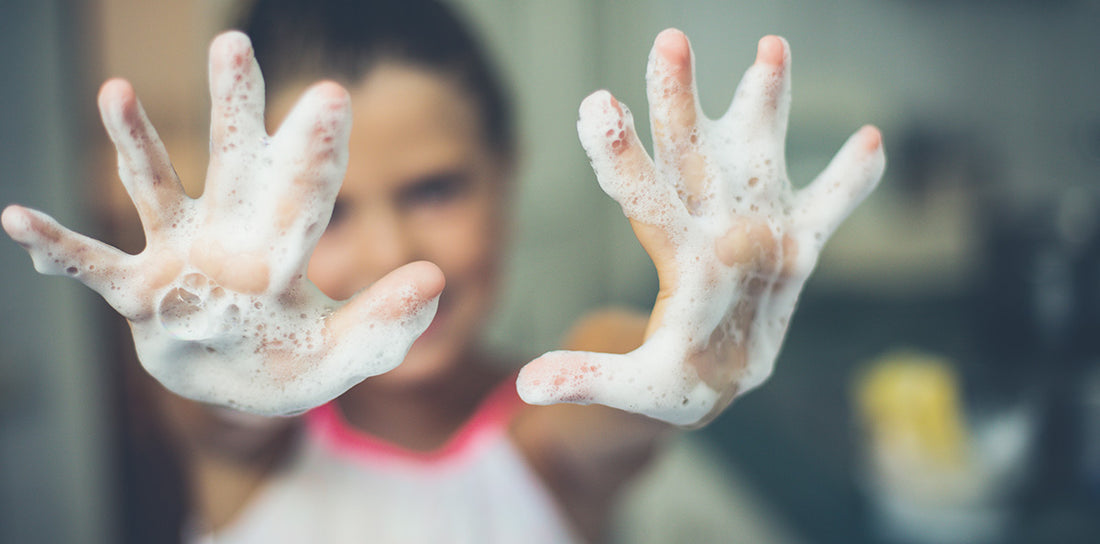I felt compelled to let our customers know that antibacterial soap isn’t all it’s cracked up to be. So, I decided to share this article with you.
Antibacterial cleaners don’t work any better than regular ones – and they damage the environment. By Matthew Hoffman, MD
Medically Reviewed by Michael W. Smith, MD on May 06, 2009
FROM THE WEBMD ARCHIVES
Antibacterial. There’s something about the very word that provides a feeling of protection. After all, germs are everywhere. Health experts tell us to wash our hands often to avoid illness. So why not use a product that seems to give an extra edge against the bad guys?
Fueled by demand, antibacterial soaps and cleansers have become the dominant products in their category. Today, more than three-quarters of soaps contain an antibacterial ingredient. We talk with our wallets and manufacturers have listened, adding antibacterial chemicals to toothpaste, socks, plastic kitchenware, and even toys.

Still, keeping your home clean doesn’t mean you have to use these products, experts tell WebMD. Antibacterial and harsh cleansers are usually unnecessary. These products don’t work any better than regular cleansers –and they damage the environment and potentially place our long-term health at risk.
Allison Aiello, PhD, assistant professor of epidemiology at the University of Michigan, headed a group that analyzed several studies comparing people who washed their hands with regular or antibacterial soap. In all but one trial, she tells WebMD, “There was no difference between groups, either in bacteria on the hands or in rates of illness.” In a single study, people who used antibacterial soap did have fewer bacteria on their hands, but only if they washed for 30 seconds, 18 times a day, for five days straight.

Why don’t antibacterial soaps work any better than regular soap? They do prevent illness in health care settings, where patients are more vulnerable to germs. But the antibacterial ingredients in hospital-strength soaps are up to 10 times the concentration of store-bought soap, according to Aiello.
“Also, antibacterial ingredients don’t kill viruses, which cause the vast majority of minor illnesses people experience,” she adds. That includes colds, flu, and stomach bugs.
Aiding the Rise of Superbugs?
Early evidence suggests that the explosion in use of antibacterial cleansers may not be benign.
Antibacterial ingredients have become so popular, they’re literally in our blood. In addition to lead and pesticides, the CDC now periodically monitors levels of triclosan, the most common antibacterial agent, in randomly selected Americans.
At CDC’s last check in 2004, “about three-quarters of adults and children older than six had detectable levels of triclosan,” according to Antonia Calafat, PhD, lead research chemist with CDC’s National Center for Environmental Health.
People in higher income brackets had the highest levels, Calafat tells WebMD. “Most likely it was related to use of products containing triclosan, although unfortunately we didn’t have that kind of lifestyle information from the participants,” she says. Triclosan can enter the bloodstream through the skin, the mucous membranes in the mouth, or the intestines.
Could a daily dose of triclosan cause health problems? Experimental studies show that triclosan can cause bacteria to become resistant to antibiotics in test tubes. So far, no one knows whether that leads to the same result in hospitals or homes. Some researchers, though, believe resistant “superbugs” created by widespread antibacterial soap use could be a real possibility.
Aiello’s research “showed a trend toward more resistant bacteria” on peoples’ hands after one year of using antibacterial soap. The finding didn’t reach the threshold for statistical proof, but Aiello says, “that might only be because we didn’t follow people long enough.”
Antibacterials in the Environment
Antibacterial soap’s potential to harm people may be controversial, but its growing environmental impact is widely acknowledged. The ingredients in antibacterial cleansers are building up in the environment at a rate that alarms leading researchers.
According to Rolf Halden, PhD, associate professor at Arizona State University’s Biodesign Institute, several million pounds of triclosan and triclocarban (an antibacterial chemical in bar soap) are produced annually. Much of it is flushed or rinsed down drainpipes. “Water treatment plants don’t process the chemicals well. They end up in surface waters, frequently at concentrations that are toxic to aquatic life,” Halden says.
“Walk up to any two streams in the U.S., and one will contain triclosan and triclocarban,” says Halden. “These are by no means ‘green’ chemicals. They do not degrade readily, and they tend to persist in the environment for long periods of time. There is still triclocarban in Jamaica Bay [New York] from the 1950s.”

Additionally, Halden believes that concentrated antibacterial agents in “biosolids” (what’s left over after sewage is treated) are the perfect environment to breed antibiotic-resistant bacteria. Very little research has been done on this “municipal sludge,” Halden says, “but that’s the place we need to start looking for [bacterial] resistance, because that’s where the pathogens are.”
The FDA and EPA are examining antibacterial soap’s impact on human and environmental health. A 2005 FDA advisory committee found no benefit to antibacterial over regular soap, but potential risks, opening the door to tighter regulation. In response to recent studies, the EPA has said it will formally review triclosan in 2013 -- ten years earlier than previously planned.
Some scientists feel that change is already overdue. In Halden’s view, “without any demonstrated benefit, and with the clear risks to the environment and possibly our health, it’s difficult to justify the ongoing use of these products.”
Nontoxic Solutions

Wash your hands thoroughly and frequently. It’s not the type of soap that prevents the spread of bacteria and viruses, it’s how you wash your hands. Lather up and rub hands together vigorously for 20 seconds. Don’t forget the spaces between your fingers, your wrists, and under your nails. Rinse thoroughly. Dry hands well and launder hand towels often in hot water.
Choose a nontoxic cleaner: Shop for "green" and environmentally friendly cleaners that don't contain triclosan or triclocarbon. Skip these ingredients, too: chlorine, lye, glycol ethers, and ammonia. You don't need them to get surfaces clean. Culleoka Company’s Foaming Natural Hand Soap contains natural scrubbers, conditioners, and moisturizers to clean, condition and protect. Cully's holds true to our desire to remove toxins - no harshness included, only goodness and with your hands in mind. Clean hands without compromise. Our Foam hand soap products are crafted clean. We also avoid using products like Sulfates, Parabens, and Dyes.

Disinfect objects that come into contact with raw meat, fish, or eggs, such as cutting boards and utensils: use a dishwasher and be sure it reaches 171 degrees F and choose an environmentally friendly detergent. Spray cutting boards and counters with a non-toxic disinfectant. You can find such cleaners in stores or make your own by using white vinegar followed by 3% hydrogen peroxide (available in drugstores). Keep the liquids handy in separate spray bottles. It doesn't matter which one you use first, but both are much more effective than either one alone.
Disinfect sponges and rags: Microwave for 30 seconds on high power if dry, longer if wet -- sponges for one minute, and rags for three minutes.
Clean bathrooms and kitchen hard surfaces: Buy a nontoxic cleaner or make your own. Culleoka Company’s natural based Cleaner is an all-purpose cleaner packed with 7 types of probiotics that produce powerful enzymes and plant-based cleaners (we call scrubbers). They work together to break down soils and organic matter, including food-based grease & oils, blood, fecal matter, urine salts, and more – creating a positive impact on your surroundings.
I hope that now understand why it is unnecessary and unhealthy to continue using anti-bacterial products. Culleoka Company’s solutions are natural based and good for you and the environment.
God Speed!
~Sonny Hobbs,
Founder
Culleoka Company, LCC
A little about Sonny Hobbs and The Culleoka Company
(1) About Us (culleokacompany.com)
All rights reserved

